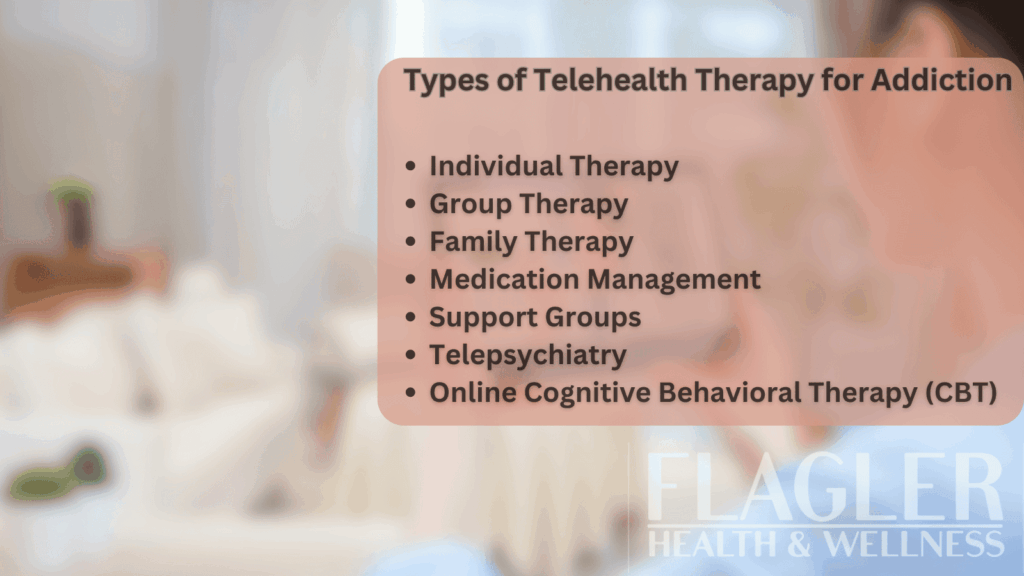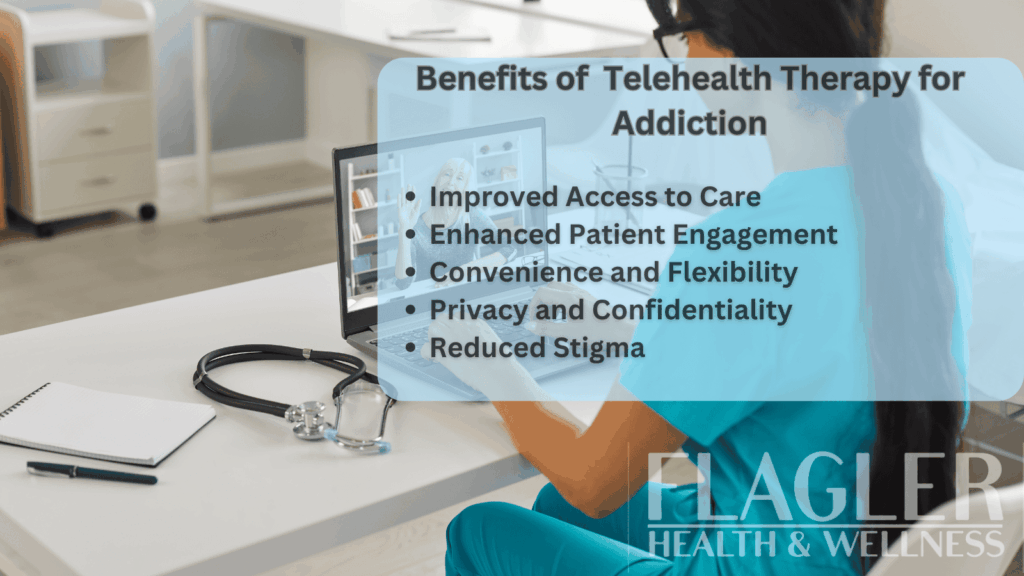Telehealth therapy for addiction involves using technology and secure communication platforms to connect individuals with addiction concerns to qualified therapists and counselors remotely. It breaks down geographical barriers and provides treatment options regardless of location.
The use of telehealth therapy in addiction treatment has gained traction in recent years due to the increasing need for accessible mental health services, especially for those facing addiction-related issues. It offers a practical solution by reaching a wider audience, overcoming obstacles like limited transportation options or residing in remote areas with limited in-person treatment options.
Types of telehealth therapy include individual therapy, group therapy, and family therapy. Individual therapy allows for personalized one-on-one sessions via telecommunication, ensuring privacy. Group therapy, on the other hand, offers virtual support groups and counseling sessions, fostering a sense of community. Lastly, family therapy involves telehealth sessions with the patient, their family members, and a therapist, promoting healing and understanding within the family unit.
The process of telehealth therapy for addiction involves several key steps such as initial assessment, intake occur through telecommunication, enabling therapists to gather relevant information. Treatment planning and goal setting are collaborative, tailoring the approach to address specific addiction concerns. Therapy sessions are conducted remotely using secure communication platforms, prioritizing privacy and comfort.
Research and studies have shown positive outcomes for telehealth therapy, demonstrating its effectiveness in addressing addiction-related issues. Comparisons with traditional in-person therapy reveal comparable or superior treatment outcomes.
What is Telehealth Therapy for Addiction?
Telehealth therapy for addiction utilizes digital communication technologies to offer healthcare services from a distance, enabling remote access to telehealth treatment for those in need.
This method allows individuals to receive support and treatment without needing to visit a healthcare facility physically. It forms a virtual bridge between medical and mental health practitioners and individuals seeking treatment, enabling remote sessions that transcend geographical barriers.
Whether it’s phone calls, video conferences, text messaging, or online platforms, telehealth therapy leverages a multitude of digital mediums to deliver comprehensive care. Critical technologies that power telehealth addiction treatment and telehealth therapy for addiction encompass:
- Telephone-based services
- Videoconferencing
- Texting
- Smartphone applications
- Web-based tools
These technologies facilitate a wide range of services, from individual and group therapy to medication management and support groups. By harnessing these technologies, telehealth therapy has transformed the way addiction treatment is delivered, making it more accessible, flexible, and patient-centric.
What is The Role of Telehealth in Addiction Treatment?
The broad spectrum of telehealth therapy services ranges from online therapy and counseling to medication management and support groups to cater to nearly all levels of addiction and substance use treatment.
The providers of telehealth services for substance use disorders form a diverse group, including psychologists, licensed professional counselors, and prescribing providers. They offer a variety of treatments such as one-on-one therapy, addiction counseling, and medication management, ensuring a comprehensive approach to addiction treatment.
The use of videoconferencing and mobile apps is a favored choice among addiction treatment services. Although the efficacy of telehealth in aspects like methadone intake assessment is debated, providers are most comfortable with one-to-one counseling via telehealth. Real-world success stories of telehealth in treating substance use disorders are not uncommon. For instance, the University of Arizona’s telemedicine program led by Dr. Sue Sisley has shown impressive results across large geographical areas, with patients regaining their abilities post-treatment.
What are the Different Types of Telehealth Therapy for Addiction?

The different types of telehealth therapy commonly used in addiction treatment include:
1. Individual Therapy
Individual therapy is a one-on-one counseling session between a person and a licensed therapist. It is conducted through video conferencing platforms, phone calls, or secure messaging. Individual therapy helps individuals address their specific addiction issues, explore underlying causes, develop coping strategies, and work toward recovery goals.
2. Group Therapy
Group therapy involves a therapist facilitating a session with multiple participants who are all working towards addiction recovery. These sessions are conducted through video conferencing platforms, allowing participants to interact and support each other in a virtual group setting. Group therapy provides a sense of community, peer support, and opportunities for shared experiences among addicts looking to achieve their recovery goals.
3. Family Therapy
Family therapy involves the participation of family members or loved ones in the addiction treatment process. It is conducted remotely through telehealth platforms, allowing family members to engage in therapy sessions from separate locations. Family therapy helps improve communication, address family dynamics and conflicts, and support the recovery of both the individual with addiction and their loved ones.
4. Medication Management
In some cases, medication are prescribed to support addiction treatment. Telehealth platforms are used for medication management, including medication monitoring, adjustments, and prescription refills. Virtual appointments with healthcare providers allow for ongoing assessment of medication effectiveness and any necessary adjustments.
5. Support Groups
Telehealth platforms provide opportunities for participation in virtual support groups. These groups bring together individuals in recovery to share experiences, provide mutual support, and offer guidance and encouragement. Support groups are specific to addiction recovery.
6. Online Cognitive Behavioral Therapy (CBT)
Online CBT programs utilize structured therapeutic interventions delivered through web-based platforms. These programs often incorporate interactive modules, exercises, and feedback mechanisms to help individuals with addiction develop coping skills, address negative thought patterns, and modify behaviors contributing to substance use.
7. Telepsychiatry
Telepsychiatry involves the use of telehealth technology to provide psychiatric evaluations, medication management, and therapy sessions conducted by psychiatrists remotely. This modality is particularly relevant for individuals with co-occurring mental health disorders and addiction.
Process of Telehealth Therapy for Addiction Treatment
Telehealth therapy for addiction treatment involves a streamlined process that incorporates various processes, including:
- Contacting the telehealth therapist for prescriptions
- Initial consultations
- Verification of insurance coverage
- Individual talk therapy sessions
- Scheduling of appointments
All of these services are delivered remotely, with the backbone being digital communication technologies, primarily video conferencing, enabling real-time interaction for appointments.
To access telehealth services for substance-use treatment, individuals typically need to:
1. Contact the service provider
The process of telehealth therapy for addiction treatment begins with individuals contacting the service provider to initiate the admissions process. This initial step involves reaching out to the telehealth therapy provider through various means, such as phone calls, online forms, or email. The provider will guide individuals through the necessary steps to commence their treatment journey.
2. Initial consultations
Next, patients will undergo initial consultations with qualified therapists or counselors. These consultations take place through video conferencing or other secure communication platforms.
During these sessions, the patients will have the opportunity to discuss their addiction concerns, history, and treatment goals. Therapists will gather relevant information, develop an understanding of the individual’s unique needs, and work towards helping them heal.
3. Verify Insurance coverage
Verification of insurance coverage is an essential step in the addiction treatment process for patients seeking telehealth therapy. Once the initial consultations for addiction recovery are completed, verifying insurance coverage becomes necessary. This step ensures that individuals struggling with addiction are aware of the extent to which their insurance plan covers telehealth therapy services.
4. Schedule appointments
In addiction recovery, scheduling appointments allows individuals to secure dedicated time for their therapy sessions. Telehealth therapy offers the advantage of flexibility in scheduling to allow patients to find appointment times that best fit their schedules and commitments. It eliminates the need for travel time, making it more convenient for individuals to attend therapy sessions from the comfort of their own homes.
This is beneficial for addicts in recovery, as it reduces barriers to accessing treatment and increases the likelihood of their continued engagement in therapy.
5. Individual talk therapy sessions
During individual talk therapy sessions, patients have the opportunity to openly discuss their addiction, share their experiences, and work collaboratively with a qualified therapist. The therapist creates a supportive and non-judgmental environment where patients express their thoughts, emotions, and challenges related to addiction.
Individual talk therapy sessions focus on various aspects. They involve exploring the root causes of addiction, solving underlying emotional or psychological factors, and developing coping mechanisms to manage cravings and triggers.
Benefits of Telehealth Therapy for Addiction

Telehealth therapy for addiction offers numerous benefits that contribute to its increasing popularity and effectiveness. Here are some important benefits of telehealth therapy for addiction.
1. Improved Access to Care
Telepsychiatry has the remarkable ability to extend care to addiction patients in remote communities that lack health and behavioral services. For instance, telemedicine initiatives in rural Appalachia and a mobile care unit in Maryland, supported by the Mental Health Services Administration, have brought mental health and substance abuse care to previously underserved communities.
Telehealth services, including remote Narcotics Anonymous group therapy, have reduced wait times and stigma, providing continuity of care and convenience, thereby lowering barriers to accessing addiction treatment.
Studies suggest that telemedicine provision of medication management for opioid use disorder has the following benefits:
- Improves patient retention
- Reduces illegal drug use
- Increases chances of patients remaining in treatment longer than if they were in non-telehealth settings
It’s worth noting that there have been substantial increases in telehealth utilization for substance use disorder treatment, with millions of Americans receiving care and specific programs demonstrating success in reaching historically underserved populations.
2. Enhanced Patient Engagement
Telehealth therapy greatly enhances patient engagement by leveraging digital tools such as apps and text messaging to offer additional support and immediate assistance to addicts. This leads to improved management of cravings and increased patient engagement outside of scheduled therapy sessions.
The use of digital tools in telehealth therapy allows patients to access resources and support at their fingertips. Apps specifically designed for addiction recovery provides educational materials, coping strategies, and tools for tracking progress. These tools help patients navigate challenges, reinforce treatment goals, and provide ongoing support, even between therapy sessions.
3. Convenience and Flexibility
Telehealth therapy provides convenience and flexibility in scheduling appointments. With it, patients receive addiction treatment from the comfort of their own homes, reducing the time and effort required for travel and waiting at clinics. Telehealth therapy also offers more flexible appointment options, including evenings and weekends, accommodating individuals’ busy schedules.
4. Privacy and Confidentiality
Telehealth therapy ensures privacy and confidentiality. Sessions are conducted through secure communication platforms, maintaining the confidentiality of personal information and therapy discussions. This is important for individuals who value the privacy of their addiction treatment journey.
5. Reduced Stigma
Telehealth therapy help reduce the stigma associated with seeking addiction treatment. By receiving treatment remotely, individuals maintain greater confidentiality and privacy, which encourages more people to seek help without the fear of judgment or discrimination.
How Effective is Telehealth Therapy for Addiction Treatment?
Telehealth therapy has been extensively researched and proven effective in treating addiction. Numerous studies consistently show positive outcomes: reduced substance use, improved mental health, and increased treatment engagement and retention.
Comparisons between telehealth therapy and in-person therapy reveal similar treatment outcomes. There are no significant differences in substance use reduction, mental health improvement, or treatment engagement between the two modalities. This suggests that telehealth therapy is just as effective as traditional in-person therapy for various substance use disorders.
Telehealth therapy offers increased accessibility and convenience. It overcomes geographical barriers, allowing patients to access treatment regardless of their location. This is particularly beneficial for those in remote areas or with limited access to in-person treatment facilities.
Furthermore, telehealth therapy eliminates the need for travel, making it more convenient for individuals with mobility limitations or busy schedules. The flexibility in scheduling also allows treatment to be easily integrated into individuals’ daily lives.
What are the Challenges and Limitations of Telehealth Therapy?
Despite the numerous benefits, telehealth therapy for addiction is not without challenges and limitations. Some of these include:
- It is not suitable for individuals without stable housing or access to necessary technology.
- It is not suitable for individuals experiencing serious cases of addiction or withdrawal symptoms.
- Limited nonverbal cues in remote communication
- Technology malfunctions and disruptions during sessions
- Limited support for hands-on interventions
- The effectiveness of telehealth in treating addiction varies due to individual factors such as mental health status, available social support systems, and financial resources.
Social isolation, exacerbated during the COVID-19 pandemic, poses additional challenges for individuals with substance use disorders, increasing the burden on health services. Nevertheless, with the right support in place, telehealth therapy offer a viable and effective alternative to traditional in-person therapy.
How to Find the Right Telehealth Provider
Finding the right telehealth provider is a critical step in the journey toward recovery. When selecting a telehealth provider for addiction treatment, it’s important to consider these factors:
1. Research Provider Credentials
When searching for a telehealth provider for addiction treatment, it is crucial to ensure that they have the necessary credentials. Look for providers who are licensed and certified in their respective fields, such as addiction medicine or counseling. Verify their qualifications to ensure they have the necessary training and expertise to address substance use disorders effectively.
2. Assess Experience and Expertise
Consider the provider’s experience and expertise in addiction therapy. Look for providers who have a track record of helping individuals with similar concerns. Consider factors such as the number of years they have been practicing and any additional certifications or specializations they have that demonstrate their expertise in addiction treatment.
3. Evaluate Treatment Services
It is important to assess the types of addiction treatment services offered by the telehealth provider. Look for evidence-based treatment modalities such as individual therapy, group therapy, family therapy, and medication management. Ensure that the provider offers a range of services that align with your specific treatment needs.
4. Multidisciplinary Approach
A multidisciplinary approach involves collaboration between different healthcare professionals to provide comprehensive addiction treatment. Look for telehealth providers who work with a multidisciplinary team, including psychologists, psychiatrists, social workers, or addiction counselors. This collaborative approach provide a more holistic and effective treatment experience.
5. Personalized Treatment Plans
Personalized treatment plans are tailored to address an individual’s unique needs and goals in addiction treatment. Look for telehealth providers who prioritize personalized approaches. They should take the time to understand your specific circumstances and develop a treatment plan that is customized to your requirements. This individualized approach increases the chances of achieving successful outcomes in your recovery journey.
7. Seek Recommendations and Reviews
Seeking recommendations from trusted sources and reading online reviews provide valuable insights into the quality of care offered by telehealth providers. Ask healthcare professionals, support groups, or friends who have undergone telehealth addiction treatment for their recommendations. Also, read reviews and testimonials online to gauge the experiences of others and determine if the provider is a good fit for your needs.
8. Insurance Coverage and Cost
Before selecting a telehealth provider, it is important to understand the insurance coverage and any potential out-of-pocket costs. Confirm if the provider accepts your insurance and if there are any specific requirements or limitations. It is essential to have a clear understanding of the financial aspects of treatment to avoid any surprises or unexpected expenses.
What Questions Should You Ask Your Prospective Telehealth Therapist?
Having a set of important questions is helpful when choosing a prospective provider. Here are some questions to ask:
- What is your experience in treating addiction and what types of addiction do you specialize in?
- How long are the sessions and how often will I need to attend?
- What is the expected treatment timeline?
- What is your approach to relapse prevention?
- What is your policy on medication-assisted treatment?
- How do you collaborate with other healthcare professionals?
How does biofeedback therapy complement telehealth therapy for addiction?
Biofeedback therapy can complement telehealth therapy for addiction by providing real-time physiological feedback that helps clients gain awareness and control over their bodily functions. Telehealth platforms allow clients to participate in biofeedback sessions from the comfort of their homes, using devices that monitor heart rate, muscle tension, and other physiological indicators. This integration enhances the overall treatment process by enabling clients to learn stress management and relaxation techniques, which can reduce cravings and improve emotional regulation. Combining biofeedback with telehealth therapy creates a holistic approach that addresses both the physical and psychological aspects of addiction.
Can Cognitive Processing Therapy (CPT) be effectively delivered via telehealth for addiction treatment?
Cognitive Processing Therapy (CPT) can be effectively delivered via telehealth for addiction treatment, providing a convenient and accessible way for clients to engage in therapy. Telehealth platforms facilitate the delivery of CPT’s structured sessions, where therapists can guide clients through the process of identifying and challenging negative thought patterns related to their addiction. The virtual format allows for the use of digital tools and resources, such as worksheets and interactive exercises, enhancing the therapeutic experience. Telehealth CPT maintains the same effectiveness as in-person sessions, helping clients address both cognitive and emotional aspects of addiction.
What are the benefits of using telehealth therapy for addiction in rural areas?
Telehealth therapy for addiction offers significant benefits for individuals in rural areas, where access to specialized addiction treatment may be limited. It eliminates the need for long-distance travel, making therapy more accessible and reducing associated costs. Telehealth provides a convenient and confidential way for clients to receive support, which can be particularly important in smaller communities where anonymity is a concern. Additionally, telehealth therapy can connect clients with a wider range of specialists and resources, ensuring they receive comprehensive care tailored to their specific needs, ultimately improving treatment outcomes and accessibility.
How can Cognitive-Behavioral Therapy (CBT) be integrated into telehealth therapy for addiction?
Integrating Cognitive-Behavioral Therapy (CBT) into telehealth therapy for addiction offers a flexible and accessible approach to treatment. Through telehealth platforms, individuals engage in CBT sessions with licensed therapists remotely, using video conferencing, phone calls, or secure messaging. Telehealth allows for personalized CBT interventions tailored to each individual’s needs and preferences, facilitating ongoing support, skill-building, and progress tracking in addiction recovery.










